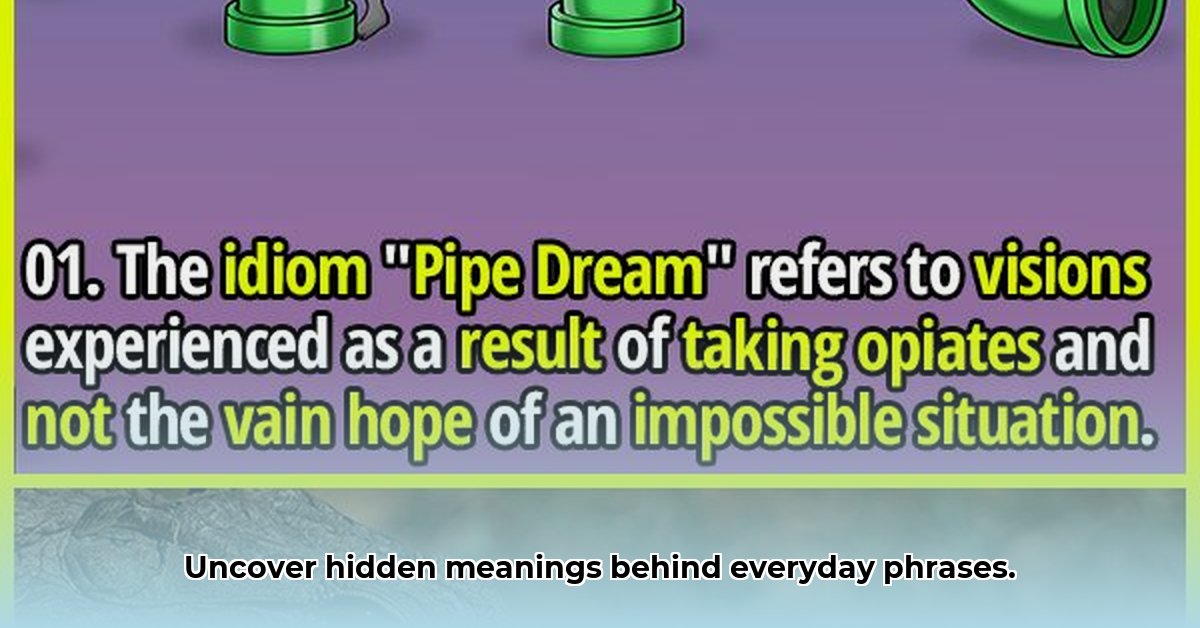Ever wondered where sayings like “bite the bullet” or “let the cat out of the bag” actually came from? This article dives into the surprising and often hilarious true stories behind some of our most common idioms and phrases. For more unusual historical linguistic curiosities, check out this article on Benjamin Franklin’s turkey letter. We’ll explore their origins, how they changed over time, and the fascinating history hiding within everyday speech. Get ready to discover the unexpected connections between language, history, and culture, and maybe even learn a thing or two about the words you use every day!
Discovering the Origins of Everyday Expressions: A Linguistic Journey
Ever wondered where those quirky sayings we use every day actually came from? They’re not just random words strung together; each idiom has a fascinating history, often a surprisingly colorful one! Let’s dive into the real stories behind some familiar phrases and explore the evolution of language.
Let the Cat Out of the Bag: Unveiling Hidden Secrets
We’ve all heard “let the cat out of the bag,” meaning to reveal a secret. But did you know this phrase might have its roots in a less-than-ethical pig-selling practice? Imagine a time before widespread refrigeration. Farmers would sometimes sell piglets in sacks. A dishonest farmer, hoping to make a quick buck, might substitute a cat for a piglet – a much cheaper, but less desirable, deal. The buyer, only finding out the truth upon opening the bag, would discover the deception. Hence, “letting the cat out of the bag” became synonymous with revealing a hidden truth, often an unpleasant one. It’s a testament to how clever wordplay can memorialize a centuries-old swindle! The idiom highlights the nuances of deceptive practices throughout history and the evolution of language to capture these moments. The first recorded use of the phrase was in the 16th century, highlighting the practice that buyers should beware of fraud!
Bite the Bullet: Enduring Hardship with Stoicism
“Bite the bullet” – a phrase that speaks volumes about perseverance in the face of hardship. Its origins aren’t nearly as metaphorical as you might think. Before modern anesthetics, battlefield surgery was excruciating. To cope with the intense pain, soldiers would literally bite down on a bullet. The image is harsh, but it perfectly encapsulates the idiom’s meaning: enduring immense discomfort or difficulty with stoicism and resolve. It’s a powerful reminder of human resilience in the face of unimaginable pain and a nod to the stoic endurance of soldiers. The expression was first recorded in the 1891 novel, The Light that Failed, and some suggest it evolved from the British empire phrase ‘to bite the cartridge’, related to the Indian Rebellion of 1857.
Steal Someone’s Thunder: Claiming Undeserved Credit
“Stealing someone’s thunder” typically refers to taking credit for someone else’s ideas or achievements. This idiom’s origins lie in the theatrical world of early 18th-century England. John Dennis, a playwright, invented a special sound effect – a rumbling machine to mimic the sound of thunder. However, a rival playwright later incorporated this very same effect into their own play, essentially stealing the spotlight from Dennis’s innovation. Dennis was understandably furious, complaining bitterly about this blatant theft of his unique theatrical device. The idiom emphasizes the often competitive nature of creative fields and the human tendency to seek recognition. In 1704 Dennis’ play, Appius and Virginia, failed, but his thunder machine was a success; when others copied it, Dennis lamented they “stole his thunder!”
Rule of Thumb: A Practical Measurement
The phrase “rule of thumb” suggests a rough estimate or general guideline. However, its true origin holds a surprising connection to carpentry. In the past, carpenters would often use the breadth of their thumb as a quick, approximate measurement. This wasn’t the most precise way to measure, of course, offering only a rough approximation. This practical method eventually transitioned into a broader idiom representing approximations and general principles, a fascinating journey from a specific tool to a generalized concept. This illustrates how language evolves organically from practical applications to abstract concepts. While the origins are rooted in practical measurement, some controversial interpretations link this idiom to historical legal practices, stirring debate about its potentially problematic connotations.
Running Amok: An Expression of Uncontrolled Rage
“Running amok” vividly describes a state of uncontrolled rage or violent frenzy. Interestingly, this phrase isn’t originally English. It’s borrowed directly from the Malay word “amok,” describing a similar state of frenzied aggression. This demonstrates how languages naturally evolve by borrowing words or phrases from other cultures, and how a specific cultural phenomenon can thus be described across the globe. The idiom effectively illustrates cross-cultural linguistic exchange and how words gain new life and meanings in different contexts. The phrase gained popularity in England during the 17th century when travelers shared stories from foreign lands, highlighting the impact of cultural exchange on linguistic landscapes.
White Elephant: The Burden of a Costly Gift
A “white elephant” is often described as a possession that’s expensive to keep but has little use; a burden. The story doesn’t involve mystical creatures! In Thailand, white elephants were considered sacred, but extremely expensive to care for. Kings would sometimes give these animals as gifts to those they wished to burden—a cleverly disguised way of showing their displeasure or imposing a financial strain on someone. The idiom displays the subtle art of political strategy concealed within a commonplace phrase. It’s a reminder of the complex historical context behind even simple words. The practice dates back to ancient Siam (now Thailand), where these elephants were revered, yet their upkeep could financially ruin the recipient, a clever disguise in political maneuvers.
Cat Got Your Tongue?: The Mystery of Silence
“Cat got your tongue?” This seemingly simple question regarding someone’s silence has a murky past. There’s no single, definitive answer to its origins. Some experts believe the phrase might allude to medieval punishments, in which someone having their tongue forcefully “taken,” perhaps in a symbolic manner, was rendered speechless. The second possible source comes from ancient Egypt, where cats were considered to be gods and it was seen an offering to the gods to give them the tongue of a liar. Other theories exist, but the lack of a clear-cut origin contributes to the saying’s intrigue. The enduring mystery only adds to its mystique – a reminder that even the most familiar phrases can harbor hidden enigmas. The phrase could be linked to the use of the whip, cat-o’-nine-tails, used by the English Navy, leaving victims speechless from the pain.
By and Large: A Mariner’s Compass
This idiom, meaning “on the whole; everything considered,” originates from the nautical world. “By” refers to sailing close to the wind, while “large” indicates sailing with the wind at your back. Thus, “by and large” encompasses all possible sailing conditions, translating to a general overview. This nautical origin highlights how maritime history has significantly shaped the English language, embedding seafaring experiences into everyday expressions.
Blood is Thicker Than Water: Bonds of the Covenant
“Blood is thicker than water” is often interpreted to mean that family bonds are the strongest. However, the original meaning is quite different. The full quote is “The blood of the covenant is thicker than the water of the womb.” This refers to the bonds forged in shared struggles, like those of soldiers in battle, being stronger than familial ties. This illustrates how idioms can be misinterpreted over time; understanding the original context is crucial to grasping the true meaning.
Chew the Fat: Sailor’s Salty Stories
“Chew the fat” means to engage in lengthy, idle chatter, but its origins lie in the rations of sailors. Before refrigeration, ships carried salted pork, often more fat than meat. Sailors would chew on this tough fat to pass the time and stave off hunger, all while complaining and sharing stories. This mundane maritime practice evolved into a colorful idiom for casual conversation.
Gadzooks!: A Minced Oath
“Gadzooks!” might sound like a silly exclamation, but it’s actually a minced oath. These were euphemistic substitutes for stronger, blasphemous phrases. “Gadzooks!” is a stand-in for “God’s hooks,” referring to the nails used in the Crucifixion. This highlights how religious beliefs and social taboos have influenced language, resulting in creative ways to express strong emotions without causing offense. Other minced oaths include zounds (“God’s wounds”) and egad (“Oh God”).
Give the Cold Shoulder: Medieval Hospitality
“Give the cold shoulder” means to deliberately be unfriendly or dismissive. This phrase originated from medieval English etiquette. Hosts would signal to unwanted guests that it was time to leave by serving them a cold shoulder of mutton or pork, indicating that the meal was over and their presence was no longer desired. This reveals how even subtle social cues can become ingrained in language, reflecting customs and expectations.
Once in a Blue Moon: A Rare Celestial Event
“Once in a blue moon” means something that happens very rarely. This idiom comes from the astronomical phenomenon of a blue moon, which is either the second full moon in a calendar month or the third of four full moons in a season. Because blue moons occur infrequently, the phrase became synonymous with rare occurrences. While a blue moon typically looks gray or white, certain atmospheric conditions, such as volcanic eruptions or forest fires, can cause it to appear blue, adding to its mystique. It’s visible once every 2.7 years.
Under the Weather: A Sailor’s Retreat
“Under the weather” means feeling unwell. This phrase comes from the nautical world, where sailors who were seasick would go below deck to get away from the wind and waves, literally going “under the weather” to seek shelter and recover. This maritime origin highlights how seafaring experiences have enriched the English language with vivid and relatable expressions, capturing the common human experience of feeling ill.
Till the Cows Come Home: An Endless Wait
“Till the cows come home” means for a very long time or indefinitely. This idiom refers to the fact that cows were often milked in the barns at night, making that task one of the last on a farmer’s to-do list. The expression implies a task that takes a long time or is never really completed. It has been around since at least the late 1500s.
Fly off the Handle: Losing Control
“Fly off the handle” means to suddenly lose one’s temper. This idiom has roots in the days before mass merchandising, when poorly fastened axe heads would fly off while they were in use. The result was dangerous, hence why the phrase is used to describe risky behavior with unpredictable results.
Close but No Cigar: Near Miss
“Close but no cigar” means to come very close to succeeding but ultimately failing. Carnival games nowadays give out stuffed animals as prizes, but, in the past, the games were targeted to adults, not kids. Instead of getting a giant teddy bear, winners might get a cigar. If they almost won but didn’t earn that prize, they’d be “close, but no cigar.” By the 1930s, the phrase extended beyond fairgrounds to everyday close shots.
The Seven-Year Itch: A Longing for Change
“The seven-year itch” refers to a feeling of restlessness or dissatisfaction that can arise after being in a relationship or situation for a long time. Before the phrase became associated with Marilyn Monroe’s iconic skirt, the “seven-year itch” felt much worse than a playful subway breeze. The term originally referred to scabies, an itchy infection caused by mites burrowing underneath a person’s skin. Its “seven-year” moniker referred to how long the bugs could linger.
Blood is Thicker Than Water: The Battlefield Bond
Despite common interpretation, this phrase originally emphasized bonds created by shared experiences over familial ties, stating, “The blood of the covenant is thicker than the water of the womb.” It underscores that relationships forged through shared struggles often surpass family connections in strength.
The Walls Have Ears: Spies in the Palace
“The walls have ears” means to be careful about what you say because you might be overheard. The face Louvre Palace in France was believed to have a network of listening tubes so that it would be possible to hear everything that was said in different rooms. People say that this is how the Queen Catherine de’Medici discovered political secrets and plots.
Bury The Hatchet: Making Peace
“Bury the hatchet” means to make peace. During negotiations between Puritans and Native Americans men would bury all of their weapons, making them inaccessible.
Cold Feet: Loss of Nerve
“Cold feet” means loss of nerve or confidence. This idiom originates from a military term, warriors who had frozen feet were not able to rush into battle.
Big Wig: An Important Person
“Big wig” means an important person, especially in a particular sphere. Back in the 18th century, the most important political figures would wear the biggest wigs, hence today influential people are called big wigs.
Caught Red-Handed: Guilty as Charged
“Caught red-handed” means used to indicate that a person has been discovered in or just after the act of doing something wrong or illegal. There was an old law stating that if someone butchered an animal that didn’t belong to him, he would only be punished if he was caught with blood on his hands. If one was caught with the meat but his hands were clean, he would not be punished.
Raining Cats And Dogs: A Downpour
“Raining cats and dogs” means rain very hard. This idiom has two stories that try to explain its origin. The first explanation says that the origin of this phrase comes from Norse mythology, where cats would symbolise heavy rains and dogs were associated with the God of storms, Odin. The second version says that in 16th century England, houses had thatched roofs which were one of the few places where animals were able to get warm. Sometimes, when it would start to rain heavily, roofs would get slippery and cats and dogs would fall off, making it look like it’s raining cats and dogs!
Don’t Look A Gift Horse In The Mouth: Be Grateful
“Don’t look a gift horse in the mouth” means find fault with something that has been received as a gift or favor. While buying a horse, people would determine the horse’s age and condition based on its teeth, and then decide whether they want to buy it or not. This is the reason why people use this idiom to say it is rude to look for flaws in a thing that was given to you as a gift.
Barking Up The Wrong Tree: Misguided Pursuit
“Barking up the wrong tree” means be pursuing a mistaken or misguided line of thought or course of action. This phrase refers to hunting dogs who chase their prey up a tree. Once it climbed the tree the dogs bark at them, yet sometimes the dogs would continue barking even if the prey was no longer there.
Turn A Blind Eye: Pretend not to notice
“Turn a blind eye” means pretend not to notice. It is believed that this phrase originates with naval hero Horatio Nelson, who used his blind eye to look through his telescope. This way he was able to avoid signals from his superior, who wanted him to withdraw from battle. He attacked, nevertheless, and was victorious.
One For The Road: A Parting Drink
“One for the road” means a final drink before leaving a place. During the middle ages, the condemned ones were taken through what today is known as Oxford Street to their execution. During this final trip, the cart would stop and they would be allowed to have one final drink before their death.
Honeymoon: A Sweet Beginning
“Honeymoon” means a holiday spent together by a newly married couple. According to tradition, a newly wed couple would have to drink a beverage with honey for an entire month for fertility and good luck.
Break A Leg: A Theatrical Blessing
“Break a leg” means good luck! It is believed that the phrase dates to World War I Germany and a saying used by German actors “Hals- und Beinbruch” which translates to “a broken neck and a broken leg.” Besides that, it still doesn’t make sense why would you wish someone to break a leg? Well, as it turns out, popular folklore down through the ages encouraged people to wish others bad luck since it was believed that wishing someone good luck would tempt evil spirits. So, you guessed it, people started wishing each other to break a leg in order for them not to break one!
Riding Shotgun: Protecting the Stagecoach
“Riding shotgun” means used to claim the right to sit in the front passenger seat of a vehicle on a particular journey. This expression refers to the passenger of an old fashioned stagecoach, who sat next to the driver with a shotgun to protect from attackers and robbers along the way. There is no evidence to suggest the expression was actually used in times of the ‘Wild West,’ but most likely came about much later on, when media and films began to romanticize the period.
Crocodile Tears: Insincere Grief
“Crocodile Tears” means tears or expressions of sorrow that are insincere. Written in the 14th century, a book called “The Travels of Sir John Mandeville” recounts a knight’s adventures through Asia. In the book it says that crocodiles shed tears while eating a man they captured. Even though it is factually inaccurate, the phrase ‘crocodile tears’ found its way into Shakespeare’s work and became an idiom in the 16th century, symbolizing insincere grief.
Kick The Bucket: A Gruesome End
“Kick the bucket” means to die. When killing a cow at slaughterhouses, people would place a bucket under the animal while it was positioned on a pulley. While trying to adjust the animal, the cow would kick out its legs and therefore kick the bucket before being killed.
Show Your True Colors: Revealing Intentions
“Show Your True Colors” means reveal one’s real character or intentions, especially when these are disreputable or dishonorable. To confuse their enemies, warships would use multiple flags. However warfare rules dictated that the ships must show its actual flag before firing and hence, the ships would then display its true colors.
Waking Up On The Wrong Side Of The Bed: A Bad Start
“Waking up on the wrong side of the bed” means start the day in a bad temper. Throughout history the left side of basically anything was considered to be ‘the evil side,’ so waking up on the left side was also considered a sign of bad luck. To ward off evil, house owners would push the left sides of the beds to the corner, so their guests would have no other option than to get up on the right side.
Butter Someone Up: Seeking Divine Favor
“Butter Someone Up” means flatter or otherwise ingratiate oneself with someone. The people ancient India used to throw balls of clarified butter at the statues of gods in order to seek a favor.
Put A Sock In It: Silence!
“Put A Sock In It” means stop talking. In the late 19th century people would use woollen socks to stuff the horns of their gramophones or record players to lower the sound, since these machines had no volume controllers.
Sun Of A Gun: A Sailor’s Lineage
“Sun Of A Gun” means A jocular or affectionate way of addressing or referring to someone. Back in the day, sailors would sometimes take their wives on long ocean voyages. It is believed that if the woman gave birth on a ship, it should take place between the cannons on the ship’s gun deck, since it was the most secluded place. Because of this reason, a child that was born on a ship would be called ‘a son of a gun’.
Best Man: Guarding the Bride
“Best Man” means A male friend or relative chosen by a bridegroom to assist him at his wedding. It is said that during feudal days it was possible that a rival Lord would try to break up a wedding ceremony and steal the bride for political reasons. To avoid any trouble, grooms would ask their best friends to stand next to them during the ceremony so they would help during the possible battle. The man, standing next to the groom was named ‘Best Man’.
Born With A Silver Spoon In Your Mouth: Wealthy Origins
“Born With A Silver Spoon In Your Mouth” means be born into a wealthy family of high social standing. It is an old tradition for godparents to gift a silver spoon to a christened child. However, not everyone was able to afford this type of luxury gift so those who did receive the spoon as a gift were considered to be wealthy, sometimes even spoiled.
Get One’s Goat: Irritating Antagonism
“Get One’s Goat” means irritate someone. During horse racing some horses would get anxious, so owners would places goats in the stalls with them to calm them down. Rival horse owners would sometimes steal these goats therefore upsetting the horse and making it more likely to lose.
Achilles Heel: A Fatal Weakness
“Achilles Heel” means A weakness or vulnerable point. This phrase comes from Greek mythology, where Thetis dipped her son Achilles in the Styx, a river that was believed to be a source of incredible power and invulnerability. However, this was holding her son by his heel, meaning it was the only part of his body that was not touched by water, making his heel vulnerable. Eventually, Achilles was killed by the shot of an arrow in his heel.
My Ears Are Burning: Being Talked About
“My Ears Are Burning” means One is subconsciously aware of being talked about or criticized. The idiom dates back to ancient Romans who believed that burning sensations in various organs had different meanings. In fact, it was believed that if your left ear is burning it signaled an evil intent, and if your right ear was burning you were actually being praised.
Blue Blood: Noble Lineage
“Blue Blood” means Noble birth. Saying that some has blue blood comes from the Middle Ages, where it was believed that those who had pale skin (meaning their ancestor have not inter-married with darker skin partners) were noble or aristocrat. The main reasoning behind it is that when your skin is really pale, the veins are more visible and they usually look quite blue.
Every Cloud Has A Silver Lining: Optimism in Adversity
“Every Cloud Has A Silver Lining” means Negative occurrence may have a positive aspect to it. This expression can be traced directly from a piece written in 1634 by English poet John Milton called Comus: A Mask Presented at Ludlow Castle. He spoke of a silver lining of brightness behind a gloomy cloud, and soon afterward ‘Milton’s clouds’ became a staple of English Literature. The proverb ‘every cloud has a silver lining’ eventually came into being in the 1800’s, a time of optimism and positivity in the upper-classes of Victorian England.
The Whole 9 Yards: Giving It Your All
“The Whole 9 Yards” means To do everything that is possible or available. During World War II, pilots would have a 9-yard chain of ammunition. When a fighter pilot used all of their ammunition on one target, they would give ‘The whole 9 yards.”
Sleep Tight: Secure Rest
“Sleep Tight” means Sleep well (said to someone when parting from them at night). It is believed that the saying comes from Shakespeare’s time when mattresses were secured by ropes. During that time, sleeping tight meant sleeping with the ropes pulled tight, making a well-sprung bed.
Piece Of Cake: Effortless Achievement
“Piece Of Cake” means Something easily achieved. The saying ‘Piece of Cake’ comes from American poet Ogden Nash who, in 1930, was quoted saying ‘Life’s a piece of cake’.
Spill The Beans: Revealing Secrets
“Spill The Beans” means Reveal secret information unintentionally or indiscreetly. This saying comes from Ancient Greece, where voting was done using beans. Citizens would put a white bean into the jar of a candidate they support, and a black one for a candidate that they do not approve of. However, on a few occasions clumsy people would spill the jars, revealing classified information.
Pull Out All The Stops: Maximum Effort
“Pull Out All The Stops” means Make a very great effort to achieve something. Organ consoles have knobs that are called ‘stops’. Without them the organist can play at a much higher volume, so ‘pulling out all the stops’ would let the organist squeeze the maximum volume out of the instrument.
Run Amok: Uncontrolled Frenzy
“Run Amok” means Behave uncontrollably and disruptively. The saying comes from the Malaysian word amoq, which describes the bizarre behaviour of tribesmen who, under the influence of opium, would become wild and attack people.
Resting On Laurels: Complacent Satisfaction
“Resting On Laurels” means Be so satisfied with what one has already achieved that one makes no further effort. Since ancient Greece laurel branches symbolized victory and success. This plan was closely tied to Apollo, the god of music, prophecy and poetry. Laurel branches were given to victorious athletes in ancient Greece and later to generals who won important battles, thus the term ‘laureates’ and the phrase ‘resting on laurels’. In the 19th century, the term received a negative connotation to describe those who are overly satisfied with their achievements.
Eat Humble Pie: Accepting Humiliation
“Eat Humble Pie” means Make a humble apology and accept humiliation. In the Middle Ages there would be a huge feast after a hunt. The lord of the manor would receive the finest piece of meat, and the ones with a lower status would eat a pie filled with entrails and innards, which were also known as “umbles”. Those who would eat the “umble pie” were considered to be humiliated, since it symbolized their lower status.
Hands Down: Decisive Victory
“Hands Down” means Easily and decisively; without question. Hands down is an idiom born from the world of horse racing. Think about it. You are so far ahead of the chasing pack that you, as the jockey, can sit back, relax, and still win the race even without your hands on the reins. Winning ‘at a canter’ is a similar expression also from the track, but this one is better, hands down.
Take The Piss: Mockery
“Take The Piss” means Mock someone or something. Back in the day, when clothes were dyed with natural dye, stale urine was used as a mordant, which stops the natural dye from leaching out of the cloth. The textile industry needed all the urine it could get, so workers would go around and collect specially designated chamber pots full of urine from people’s houses. It was probably the least desirable job at the time, so people who did it would often lie about their profession. And so the question was born from those in doubt: “Really? Are taking the piss?
Wolf In Sheep’s Clothing: Deceptive Appearances
“Wolf In Sheep’s Clothing” means A person or thing that appears friendly or harmless but is really hostile. The warning that you can’t necessarily trust someone who appears kind and friendly on the outside is centuries old, dating back to the bible. In the English language, The King James Version of the Bible, from 1611, has this passage in Matthew 7:15: Beware of false prophets, which come to you in sheep’s clothing, but inwardly they are ravening wolves.
Pulling Someone’s Leg: Playful Deception
“Pulling Someone’s Leg” means Deceive someone playfully; tease someone. While there is no evidence to back up these claims, there are two popular theories for the origins of this playful expression, neither of them particularly playful. The first relates to thieves in medieval times, who apparently pulled on the legs of their victims to trip them, and swiftly make off with their booty. The second theory comes from the Tyburn, the principal place of execution in Ye Olde England. It referred to the so-called ‘hangers-on’ who tugged at the legs of people being hanged to give them a mercifully swift death. Neither of these theories are really plausible however, so the search for the true origin continues.
Let Your Hair Down: Uninhibited Behavior
“Let Your Hair Down” means Behave uninhibitedly. It was an important rule between Parisian nobles to wear elaborate hairdos while in public, and some of the looks required hours of long work. Clearly, a moment of taking your hair down after a long day became associated with a relaxing ritual.
To Sell Someone Down The River: Betrayal for Self-Gain
“To Sell Someone Down The River” means Betray someone, especially so as to benefit oneself. This idiom comes from 19th century, in the Southern states of America. During this period it was already illegal to import slaves, so there would be internal trades where people would ship slaves down the Mississippi river and sell them at the market. For this reason, ‘selling someone down the river’ symbolizes betraying someone and using them for your own good.
Read The Riot Act: A Severe Warning
“Read The Riot Act” means Give someone a strong warning that they must improve their behavior. In 18th century England the Riot Act was a legal document, that was read aloud in front of a crowd bigger than 12 people that were considered a threat to the peace. A public official would read a small part of the Act and order people to leave peacefully within an hour, anyone that remained after one hour was subject to arrest or removal by force.
Rule Of Thumb: An Approximate Guide
“Rule Of Thumb” means A broadly accurate guide or principle, based on experience or practice rather than theory. It is believed that the rule of thumb comes from 17th century England, where Judge Sir Francis Buller ruled that husbands can beat their wives with a stick if it is no wider than his thumb.
Paint The Town Red: Flamboyant Festivities
“Paint The Town Red” means Go out and enjoy oneself flamboyantly. There are two versions on how this idiom came to use. First, it is believed that back in 1837 a famous mischief maker known as the ‘Marquis of Waterford’ had a wild night out with his group of friends, during which they knocked over flower pots, pulled knockers off of doors and even broke windows. One of their biggest acts of vandalism was painting the doors of several homes with red paint. The other version of the story says that the origin of this idiom might have originated from the brothels of the American West, where they referred to drunk men behaving as if the whole town was a red-light district.
Beat About The Bush: Avoiding the Point
“Beat About The Bush” means Discuss a matter without coming to the point. Beating about the bush is actually an action performed while hunting, driving birds and other animals out into the open. After this was done others would than catch the animals.
Break The Ice: Easing Tension
“Break The Ice” means Do or say something to relieve tension or get conversation going in a strained situation or when strangers meet. In the old days, commercial ships would often get stuck in frozen rivers during winter time, so smaller ships called “icebreakers” would come to clear a path to shore by breaking the ice. In the 17th century, people began to use the phrase to mean “to reduce tension in a social situation.”
More Than You Can Shake A Stick At: Abundance
“More Than You Can Shake A Stick At” means A large amount or quantity of something. This idiom was born when farmers, who waved sticks to herd sheep, would have more sheep than they could control.
Minding Your Ps And Qs: Polite Behavior
“Minding Your Ps And Qs” means Be careful to behave well and avoid giving offence. This expression has quite a few theories as to its origin, but our favorite refers to the practice of chalking up a ‘tab’ of drinks for later payment. The P refers to pints, and the Q is quarts. You would do well to correctly tally up the right amount as not to cause offense, especially a customer with a few beers under their belt! Again, there is little to support this theory other than the correct lettering, but we like it nonetheless.
Go Bananas: Insane Silliness
“Go Bananas” means Insane or extremely silly. The word ‘banana’ is an inherently funny word. The expression to ‘go bananas’ has no conclusive origin, but it may be linked to ‘go ape’ which became popular in the 1950’s when monkeys were being launched on rockets and were a popular subject in films and TV. The link between monkeys, bananas and crazy behaviour may have been the catalyst for the popularization of the expression. Bananas have often been central to slapstick comedy in general, with somebody slipping on a banana peel a timeless classic. Early in the 20th century people used to say ‘that’s banana oil’ when referring to a nonsense, and the expression ‘banana republic’ was pejoratively used to refer to a chaotic, backward little country that wasn’t to be taken seriously. Bananas!
Pleased As Punch: Utter Delight
“Pleased As Punch” means Feeling great delight or pride. A puppet show in the 17th century called ‘Punch and Judy’ featured a puppet named Punch, who killed people and took great joy in doing so. He would feel pleased with himself afterwards, from which the saying ‘pleased as Punch’ was born.
Called On The Carpet: Reprimanded
“Called On The Carpet” means Being severely reprimanded by someone in authority. Like many idioms, the precise origin of this one is not entirely certain. While nowadays the expression is used to refer to a reprimand, originating from the days when a servant was called from their bare-floored quarters to get an ear-bashing from the boss in carpeted opulence, there is an alternative theory to its true origins. The word ‘carpet’ used to refer to a thick cloth that could be placed anywhere, often on a table. Therefore ‘on the carpet’ used to mean that an issue was on the table, or up for discussion.
Show A Leg: Rise and Shine
“Show A Leg” means Get out of bed; get up. Just before the ships were about to leave port, sailors would try to sneak in a lady and hide them in their hammock. Before leaving, officers would ask anyone in a hammock to ‘show a leg.’ If a hairless leg appeared, the woman was asked to leave the ship quickly.
Don’t Throw The Baby Out With The Bathwater: Preserve the Good
“Don’t Throw The Baby Out With The Bathwater” means Discard something valuable along with other things that are undesirable. In the 16th century most people would bathe only once a year. And even when they did that, the entire family would bathe in the same water. Usually, it was men of the house that bathed first, followed by other males, females and finally babies. At the end of this yearly routine the water would be so dirty and cloudy that mothers would have to be careful not to throw their infants out with the water.
No Spring Chicken: Past Youth
“No Spring Chicken” means Someone who is no longer young, past his prime. In New England farmers would sell their chickens in the spring, and so the young chickens that were born in springtime would sell better than those who survived during the winter. Some farmers would try to sell their older chickens for the same price as spring chickens, which is why the saying ‘no spring chicken’ came into use to describe someone past their prime.
Go Cold Turkey: Abrupt Cessation
“Go Cold Turkey” means To quit something abruptly. It is believed that during drug withdrawal the skin of addicts turns hard to the touch, covered with goosebumps and even translucent, similar to the skin of a plucked turkey.
Jaywalker: Ignoring Traffic Rules
“Jaywalker” means One who crosses or walks in the street or road unlawfully or without regard for approaching traffic. Jay birds would often become disorientated in urban areas after flying in from the forest. Dangers in the city, like traffic for example, would leave them confused and cause erratic behaviour. Due to this, people started using the term “jaywalker” to describe someone walking the streets irresponsibly.
Table: A Cultural and Historical Guide to English Idioms
| Idiom | Meaning | Origin Context | Cultural Significance |
|---|---|---|---|
| Let the Cat Out of the Bag | Reveal a secret unintentionally | Medieval markets; dishonest pig sellers | Highlights themes of deception and exposure |
| Bite the Bullet | Endure a difficult situation bravely | 19th-century battlefield surgery; coping without anesthesia | Conveys courage and stoicism in the face of adversity |
| Steal Someone’s Thunder | Take credit for someone else’s ideas | 18th-century theatrical rivalry; playwright John Dennis’s thunder machine | Reflects competitive spirit and the struggle for recognition |
| Rule of Thumb | A general guideline; approximate measurement | Carpentry; width of a thumb as a quick measure | Emphasizes practicality and experience-based knowledge |
| Running Amok | Behave uncontrollably; violent frenzy | Malay culture; ‘amok’ = frenzied aggression | Illustrates cultural exchange and the universality of extreme emotional states |
| White Elephant | A burdensome possession of little use | Ancient Siam; sacred white elephants given as unwelcome gifts | Highlights political intrigue and the burden of unwanted responsibility |
| Cat Got Your Tongue? | Unable to speak; at a loss for words | Uncertain; possibly medieval punishment or Egyptian offerings | Suggests themes of silence, suppression, and the mystery of unspoken words |
| By and Large | On the whole; generally | Nautical; sailing in various conditions | Reflects maritime history and the idea of encompassing all possibilities |
| Blood Is Thicker Than Water | Bonds of shared struggle are stronger than familial ties | The blood of the covenant being thicker than the water of |
- Discover Queen Zenobia of Palmyra: The Warrior Queen Who Defied Rome: Her Rise and Fall - July 31, 2025
- Discover Fermentation Revolution: The Health Benefits of Kimchi: Sustainable Farming Practices - July 30, 2025
- Discover Living Crystals: The Giant Gypsum Formations in Naica’s Cave: A Geological Marvel - July 30, 2025
















